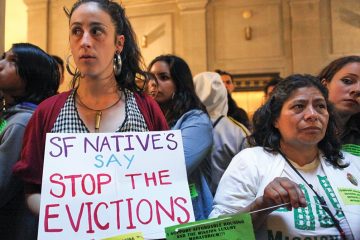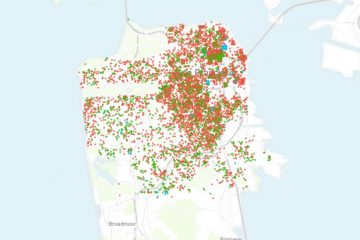How to Get Your Landlord to Make Repairs. The Smart Way
Ask a Tenants Right’s Lawyer is your chance to learn how to survive as a renter in San Francisco. Attorney Daniel Wayne has a lot of the information you need to keep you in your home. This month’s topic: When tenant’s should file a complaint with the city . Got a question? Send an email to alex@brokeassstuart.com and we will forward it on.
When Should Tenants Call the City?
So you get along with your landlord for the most part. But lately she’s been dragging her feet on some basic repairs. Even though you’ve asked a million times, she still won’t replace your leaky windows. Now you’ve got puddles of water at the baseboards and you’re wondering what you can do.
When tenants in this situation call us, one of the first things we ask is whether they’ve reported the problem to the city. Tenants can report the problem to the Department of Building Inspection (DBI) or the Department of Public Health (DPH).
To many tenants, this seems like an extreme response. Many fear that calling the city will mean starting a war with their landlord. In reality, filing a complaint can be a way to ensure basic maintenance gets done. A record of complaints can actually protect a tenant from landlord retaliation. And in more dire situations, complaints can be vital for building a legal case against a landlord.
Protect Yourself from Retaliation
If you have a problem with repairs or maintenance, complaining to the city can actually help protect you from retaliation. In California, it’s illegal for a landlord to retaliate against a tenant who has exercised a legal right. Specifically, the law states that a landlord can’t increase rent, begin eviction proceedings, or decrease services within 180 days of a tenant making a complaint regarding “tenantability.” This includes complaints made to city agencies.
Get It Done
Another benefit of getting the city involved? Landlords who won’t lift a finger following tenant complaints often leap into action when city inspectors come knocking. This is because the city can levy fines on landlords who don’t make mandated repairs within the time allotted (usually thirty days). Furthermore, when city inspectors are summoned based on, say, a complaint about a torn carpet, they might happen to notice additional violations, such as work done without permits. For these reasons, property owners tend to prefer to avoid visits from the city.
Let the Record Show
City agencies create searchable online records of all complaints. Having a recorded complaint can be beneficial for a few reasons. First, these verifiable public records are very useful for demonstrating retaliation. Second, if you ever end up in a legal dispute with your landlord, a history of recorded complaints can demonstrate a pattern of neglect. Finally, you’re doing your neighbors a favor, because other tenants can also use these complaints as evidence of bad business practices.
Who Should NOT Make Complaints?
Generally, tenants shouldn’t be afraid of calling the city. But, those who live in “illegal” units should speak with a tenant counselor or attorney before making complaints to the Department of Building Inspection.
If the space you live in is unpermitted or not up to code, there’s a chance that calling the city will trigger a process that may ultimately lead to your home being demolished or condemned. This is obviously pretty scary, so it makes sense for tenants who think their units are unpermitted to tread carefully.
This danger is fairly small, though. In consideration of the housing crisis, it’s now the policy of DBI to shut down only the most extreme, life-threatening living situations. And those tenants who are displaced should get in touch with a tenant’s attorney, since they would likely be able to recoup their damages in court.
How Do I Make a Complaint?
Anyone can make complaints to the Department of Building Inspection and the Department of Public Health.
The Department of Building Inspection is in charge of residential maintenance and housing inspection. Generally, DBI is a good place to start for maintenance problems at a property or inside your unit. DBI is also a good place to start if you believe a property owner is doing unpermitted construction or renovation. You can make a complaint by calling 311, or online.
The Department of Public Health, on the other hand, is responsible for environmental health issues. Get in touch with them if you have problems with rodents, insects, or other vermin; mold or mildew; or air quality problems like smoke or fumes. Make a complaint by calling 311 or using the 311 online complaint system.
Unsure who to call? Don’t hesitate to call both. These agencies exist to ensure city residents have safe living conditions.
What Happens When a Complaint is Made?
First, a record is created for all complaints. These records are public and searchable by address at the DBI website.
If you make an anonymous complaint, the agency will redact your name. But be aware that the location of the complaint will be recorded and publicly visible. So if you tell DBI that there’s mold in Unit 3, your landlord will be able to surmise that the occupants of that unit were the ones who called.
Generally, the agency will then attempt to conduct an inspection. Depending on the situation, they may reach out to you (the complainant) to arrange for an inspection. Or they may post a notice at the property giving notice to the owner and residents that an inspection must be conducted. If you want the interior of your unit to be inspected, make sure to respond to any communications and grant the inspectors access.
If the inspection of the property reveals code violations, the agency will issue a Notice of Violation to the owner. This notice details each violation, describes the repairs needed, and gives a deadline for making those repairs.
After that deadline has passed, DBI will again contact the owners and/or residents to do a follow-up inspection. If code violations remain outstanding, DBI will keep the case open and ultimately levy fines and penalties against the owners.
Stand Up for Your Rights
All tenants in California are entitled to safe, habitable, code-compliant homes. City agencies are tasked with ensuring that landlords meet this obligation. It’s not a perfect system, but getting in touch with city agencies can be a valuable tool for tenants.
As always, the best course of action varies depending on the particulars of your situation. A tenant’s attorney or housing rights counselor can help you decide whether it’s wise to escalate your complaint.








